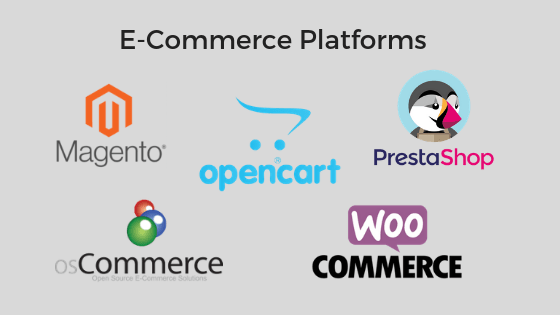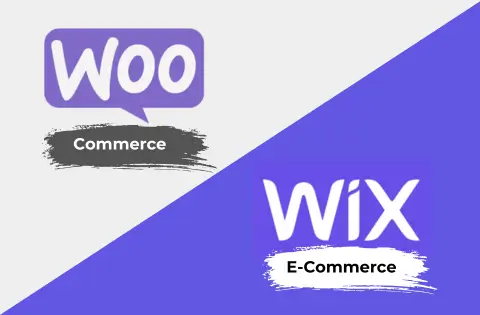7 Best Open Source Ecommerce Platform for Small Businesses

The ecommerce Platform seamlessly plays a significant role in e-commerce design and development services.
For small businesses, many e commerce platforms have been around for years as online businesses grew exponentially over the years.
So if you are not into an online venture but hold your own brand & product, certainly you have a good option to enter into an online business using an e-commerce platform that works best for your business.
Online e-commerce giants such as Amazon, eBay, Alibaba, etc are examples of huge online marketplaces.
However, to create such a huge platform, investment is too heavy and it is not viable for small businesses and enterprises.
So most of the manufacturing concerns have turned down their noses to selling on those giant platforms instead of creating their own e-commerce website.
And they’re bound to sell their products on these marketplaces because it is easy to sell on an already established market.
Every business knows well that only launching an e-commence website won’t generate any revenue or sales without prior digital promotion.
So the picture is very clear, there is again an investment in brand promotion and advertising.
And for branding online you have to consider all possible options today because it is not only about SEO or PPC.
The digital marketing scenario is changing and it is hard to push sales without building a strategy for multi-channel marketing.
But let’s keep digital promotion aside for a while and think, that we can always start small by creating the first store.
Today technology is very cheap so anyone can launch an e-commerce store easily.
And solutions as such an open-source eCommerce platform can really grow your business without much investment.
Why small businesses should consider an Open Source eCommerce platform?
You may think of open source as the free distribution of source codes that businesses use to create their own e-commerce platform.
It is shared with the purpose of setting up your business for free and adding modules to integrate and enhance your own portal.
Behind every open-source software, there is a community that is willing to contribute to society for free and for business.
And community contribution is changing the lives of millions of store owners, making it easy for store expansions and overcoming shortfalls.
So to build a robust eCommerce system, you don’t have to worry about hiring a development team, as there is already a predefined architecture to start with.
The open-source community and developers have contributed thousands of modules and extensions for use by store owners for functional upgrades.
And most of them come for free, however, there is also a paid version for almost all extensions.
Paid Modules and Extensions come in handy for every store owner to access the full functionality of any module.
So either you are in the Retail, Wholesale, or in Manufacturing sectors.
Today there is an evergreen opportunity of running your business online by adapting open-source e-commerce applications.
And this is where open-source technologies such as Magento, OpenCart, WooCommerce, etc. stand out for small businesses.
Incredible marketplace & community support: eCommerce platforms for small business
In order to run a complete e-commerce store, there are several modules that form an integrated part of your store.
From order management, and shipping to payment integration, multi-language support, or multi-store management you have a strong marketplace for these modules
And as open source technologies, most of them are available for free.
Search for free extensions that you require for your store from the Online Marketplace or pay only for what you need.
So the total cost of building an e-commerce store using such technologies is very low.
And when you compared it to the core development of an e-commerce store/modules it may extend beyond budget.
Apart from modules and extensions, the most important role played by the above e-commerce technologies is the availability of predefined themes.
These themes cater to businesses and industries from different verticals and ready available designs to set up and run an e-commerce store if not in minutes but within hours.
And if any functionality is missing in your store, use modules from the marketplace and hire a developer if any changes are required.
There is also a very strong support team to answer your query.
So here the cost of setup is almost void or under your budget to a few dollars.
Top 7 Ecommerce Platforms for Small Business
1. WooCommerce: The Most Widely Used Platform for Startups
WooCommerce is widely used as an e-commerce platform for small and medium businesses.
Because it is simple, easy and cost-effective, and widely used as an add-on to the most popular CMS system WordPress.
And WooCommerce is now the most popular ecommerce platform on the Web.
According to WooCommerce’s Offical Website, there are around 58,048,818 downloads worldwide and it powers over 28% of all online stores.
The usage and statistics of WooCommerce are increasing day by day.
And with hundreds of free and paid WooCommerce extensions, you can rest assured that there is an extension for your specific needs.
So building your online business with WooCommerce is undoubtedly relaxable and popularly used by startups and online entrepreneurs.
For more information related to setup, documentation, and WooCommerce Features you can visit the official Website
2. OpenCart: Small Business eCommerce Platform
OpenCart is one of the best free open-source e-commerce platforms that comes as a basic package.
However, you can extend your needs and scale your online business with thousands of add-ons and themes from the marketplace.
Business owners can adapt to OpenCart because there is everything you need to create, scale, and run your business online.
OpenCart is simple to start and easy to use.
Moreover, it is Open Source and free backed by powerful store management.
According to the official website OpenCart powers over 342 000 e-commerce Entrepreneurs all over the world
And provides a marketplace with over 13000+ modules and themes for all of your custom needs.
There are a number of beautiful themes for just about any sector, service integrations, payment providers, shipping methods, social media, marketing, accounting, reporting, sales as well as language packs.
And with more than 110000 registered members you are a part of one of the biggest e-commerce communities.
This community supports worldwide customers and has dedicated technical support for your project.
OpenCart also offers a cloud-hosted platform for the business owner who doesn’t have the technical background to start an e-commerce store without any delay to establish a strong online presence.
3. PrestaShop: eCommerce Platform for Small Businesses
PrestaShop is yet another e-commerce platform built on the PHP framework at its core.
So it is a good option to build your store on this platform.
And it is one of the most common additions and most popular e-commerce platforms across Europe and America for online retailers.
Also, PrestaShop provides both options to build your e-commerce store between a fully-hosted option and a self-hosted one.
And both of these versions can be availed by users free of cost.
However, there are limited e-commerce site customization features.
So to overcome this, PrestaShop has also included thousands of modules and themes on the marketplace to customize your needs.
It also supports multi-store management and storefronts for different countries to manage within a single Admin Panel and provides centralized in-depth reporting features for store owners.
PrestaShop is an efficient and innovative e-commerce platform with all the features you need to create an online store and grow your business.
According to PrestaShop’s official website, there are over 270,000 merchants and it is growing.
And with a community of 1 Million plus members, thousands of contributors, and hundreds of agencies supporting the platform.
The PrestaShop platform makes the largest and most active e-commerce communities in the world.
4. Magento: The eCommerce Platform for Large Business
Magento is a highly powerful and scalable e-commerce platform for small to large enterprises
And it is one of the prominent names in the e-commerce industry today.
According to the official site, there are over 250000 businesses and merchants worldwide and a large thriving team of developers supporting the community to answer your query.
There are 2 different editions of Magneto, Community Edition and Enterprise Edition.
Magento Community Edition is a free, open-source e-commerce platform that anyone can download and use to build an online store.
But the enterprise version will cost you annually for running your store.
Most of the big brands such as Coca-Cola, Ford, Nike, and many other prominent brands have hosted their e-commerce store on Magento
Also, there are over 10000 modules and extensions on the marketplace to support your store.
Magento is free and open-source so you take advantage of free available plugins, but some paid plugins may cost you even more than $5,000 per extension.
Also, you can get the best e-commerce themes for the Magento store on the marketplace for as high as $500 for a theme.
You also get an extensive resource library for all plugins, demos, and other helpful resources for managing your store.
For a business owner who has the less technical knowledge, Magento Commerce Starter is a great platform to start with monthly recurring charges for as high as $2000 per month.
Magento also often hosts Live programs around the world to meet and connect with Magento leaders and anyone can take part in the program.
So whether you’re a user, a developer, a CMO, or part of a Fortune 500 company you can always attend Magento seminars for staying up-to-date on top of the new features and innovations brought to you by Magento.
5. osCommerce Platform
As an online entrepreneur or a small business owner, you require a simple web application to maintain your store
And osCommerce perfectly fills the gap keeping it simpler and sober.
So anyone can use the tool to setup up a complete self-hosted online store on the osCommerce platform
Also, it is free to use and most of all secure to sell your products using online payments.
You also have full control of your online store and complete access to your data.
According to osCommerce official website, there is a growing community of over 339,550 store owners, developers, and service providers
And over 8,838 free extensions uploaded on the internet by the osCommerce community.
Therefore it makes it easier for you to customize your online store anytime.
Also backed by free and commercial support osCommerce is loved by the majority of small business owners worldwide.
osCommerce also provides a cloud-hosted platform for business owners on a monthly rental basis.
So as a non-technical business owner, you can easily host your business online.
6. nopCommerce Platform
Most free and open-source e-commerce platforms you have seen so far are built on the PHP framework.
However, nopCommerce is one such e commerce platform that is built on the most popular ASP.NET framework of Microsoft Technologies.
It is one of the most popular shopping carts in the world with around 60000 + live shops helping SMEs to build their online stores.
nopCommerce can be used by businesses of all sizes from small and medium businesses to enterprise businesses.
It comes in two variants one for the developers and the other as a preinstalled version for store owners.
The developer edition allows developers to access the free source code to build custom applications on top of nopCommerce.
And it is largely possible due to the active community of the developers which consists of more than 250,000 members.
nopCommerce documentation is available on the website, it also has a community forum and a marketplace.
So there are a number of available resources for small businesses to create their online store with nopCommerce.
You can also find certified developers in case you need premium consulting services on this platform.
7. ShopWare eCommerce Platform
Shopware is a German e-commerce platform that enables online stores to sell products and services to consumers all over the world.
With Shopware, store owners can create an online store quickly and easily, without having to learn to code.
The platform offers a wide range of features and plugins that allow store owners to customize their store according to their needs.
Shopware also offers a wide range of integrations with other platforms and applications, making it easy for store owners to connect with the tools they need to run their businesses.
Shopware has four different pricing levels, which are divided into four categories viz. community, professional, professional plus, and enterprise.
The community plan is free and allows patrons to participate in the community.
The professional plan costs 1295 per single year, while the Professional Plus plan costs 5995 per year.
The Enterprise plan is available upon special request, and there is no specified price.
Store owners can connect with Instagram, Google Analytics, Facebook Pixel, Stripe, PayPal Express Checkout, and more.
Additionally, Shopware provides great support for merchants.
A team of experts is available 24/7 to help merchants solve any issue they may encounter.
In Conclusion
There are many open-source e-commerce platforms but how do you select the best platform for your business.
In simple terms, it is advisable for micro-enterprises to adapt to WooCommerce & Oscommerce eCommerce solutions.
For Small and Medium Businesses PrestaShop and OpenCart eCommerce platforms would be a great fit.
And if you are a large enterprise Magento is undoubtedly the best fit eCommerce platform for your business.
However Small and Medium Businesses can adapt to any platform.
And depending on your budget and needs you have an array of options to choose anyone from the list.


5 Comments
These are some great platforms. ShopFunnels should be here too. I’ve been using it for the last few months & it’s going great. It has these free sales-boosting plugins which are my favourite. Makes my work so much easier!
You have shared a list of some great tools. Although, for creating an eCommerce store, I use ShopFunnels. It’s a no-code eCommerce store builder, that builds a store in a minute. It supports 100% customizable shopping cart feature and also provides abandoned cart reminders. Try adding this to the list as well.
That’s great. Thank you for your suggestion, Olivia.
This was a very informative blog and I really enjoyed reading it. But I also have a few points regarding it to discuss with you.
To survive, retailers have to stay ahead of the curve and learn how to adapt to changes in trends and consumer behaviour. eCommerce Websites are essential for running a successful eCommerce store. However, they come at a price, often requiring a large amount of time and money to build, design, and update.
Here are some of the best open source and free eCommerce platforms for 2022:-
1.)WooCommerce
2.)PrestaShop
3.)OpenCart
4.)ZenCart
WooCommerce is widely used as an e-commerce platform for small and medium businesses. Because it is simple, easy and cost-effective, and widely used as an add-on to the most popular CMS system WordPress. And WooCommerce is now the most popular e-commerce platform on the Web.